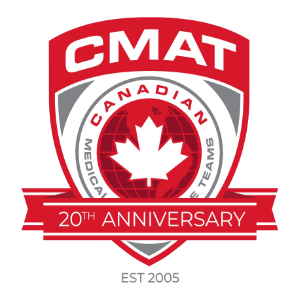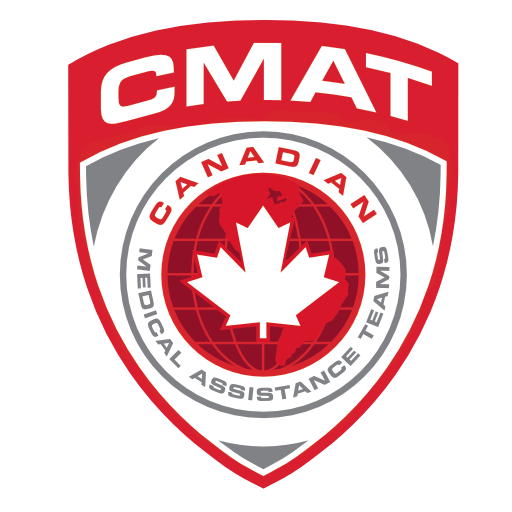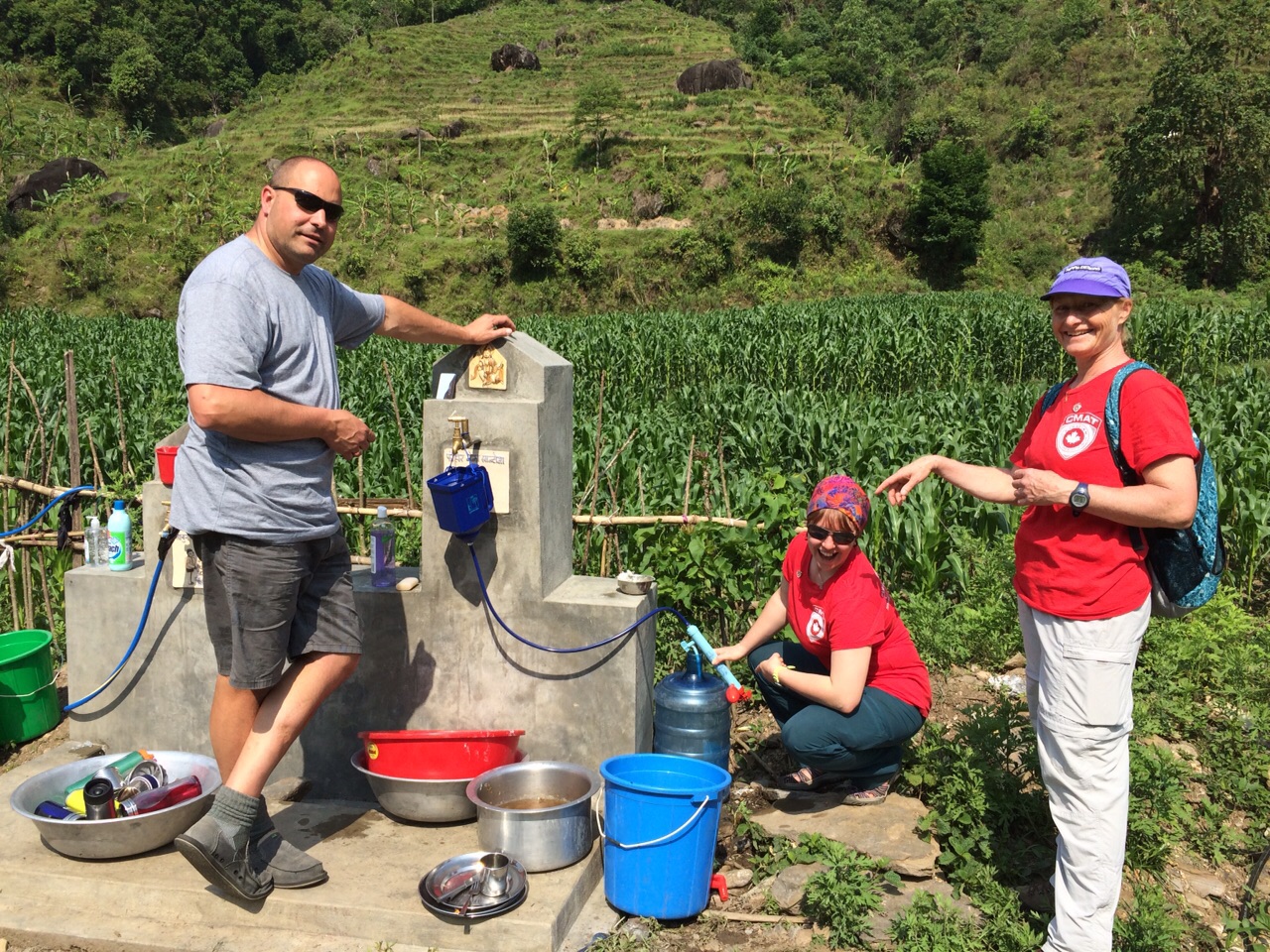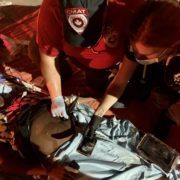CMAT Emergency Alert – Earthquake in Nepal Update #3
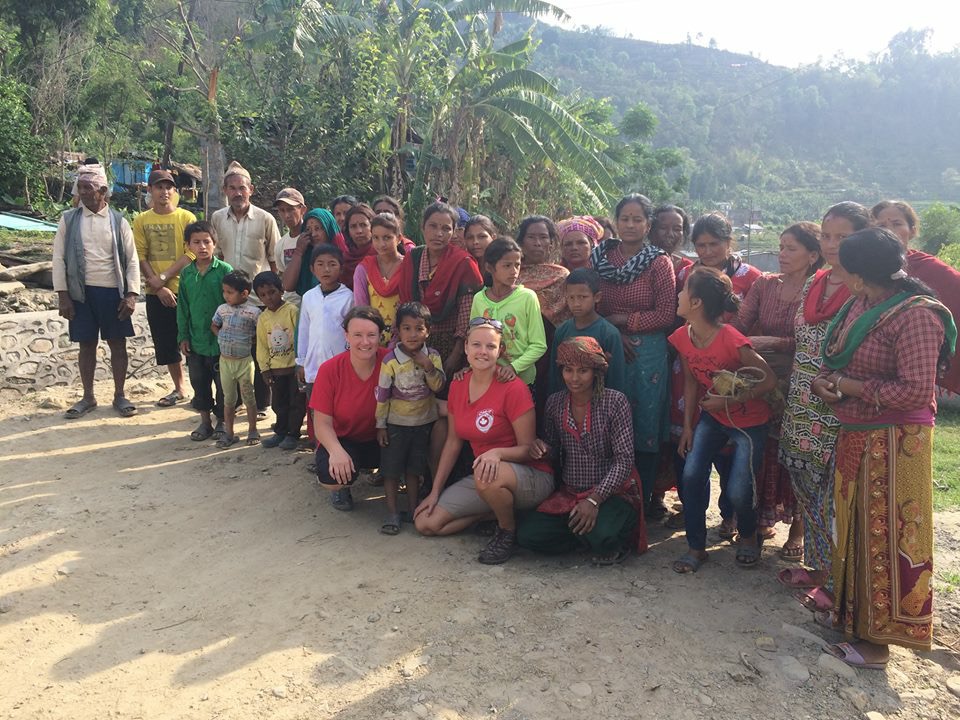
CMAT Vice Chair Kate Auger, and Team 1 Leader Teresa Berdusco in the village of Balowa conducting rapid health assessments on behalf of WHO.
Thursday May 7, 2015: CMAT Team 1 arrived in Nepal early late Sunday night, and got on the road in the early morning hours of Monday, heading for the town of Gorkha, approximately 7 to 8 hours drive northwest from Kathmandu. Having established a solid working relationship with the World Health Organization (WHO) – led health sub-cluster based in Gorkha, CMAT has been tasked by WHO to conduct rapid health surveillance in rural and remote communities outside of the main centre. Currently the team is based in the village of Balowa, with a few members conducting the health assessments, and the remainder focusing on clinical care delivery.
Part of the team initially started providing health care through mobile clinics, trekking up to isolated high mountain villages by foot, as no vehicles are able to access. In the wake of the earthquake, CMAT arrived in the region to help support the local infrastructure. The birthing centre and health centre in the region were completely destroyed by the quake. As such, basic medical needs are not being met at this time. CMAT’s field clinic is presently serving the needs of the community of Balowa, as well as more than 10 neighbouring villages.
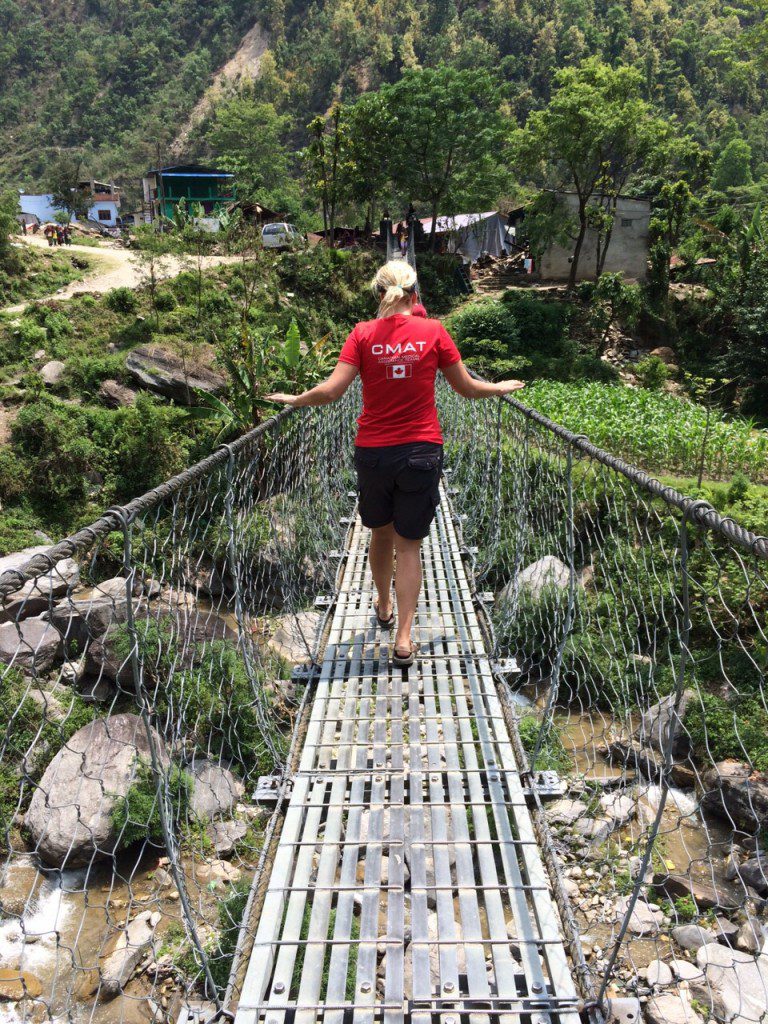
The Bridge across the river when going from camp to clinic. In the monsoon season, the water becomes very high.
While CMAT team members were still seeing earthquake related injuries even up until today, this will continue to decrease. However, the underlying primary health needs remain. Monsoon season in its truest sense will be starting in June and the heavy rains with it brings the increased risk of communicable disease.
It has been recommended that subsequent teams which are sent by CMAT comprise of 8 to 10 primary health care providers (MD/ NP), nurses and paramedics. We also plan to deploy members of our Behavioural Health Committee, to begin assessing and treating Mental Health and Psychosocial issues.
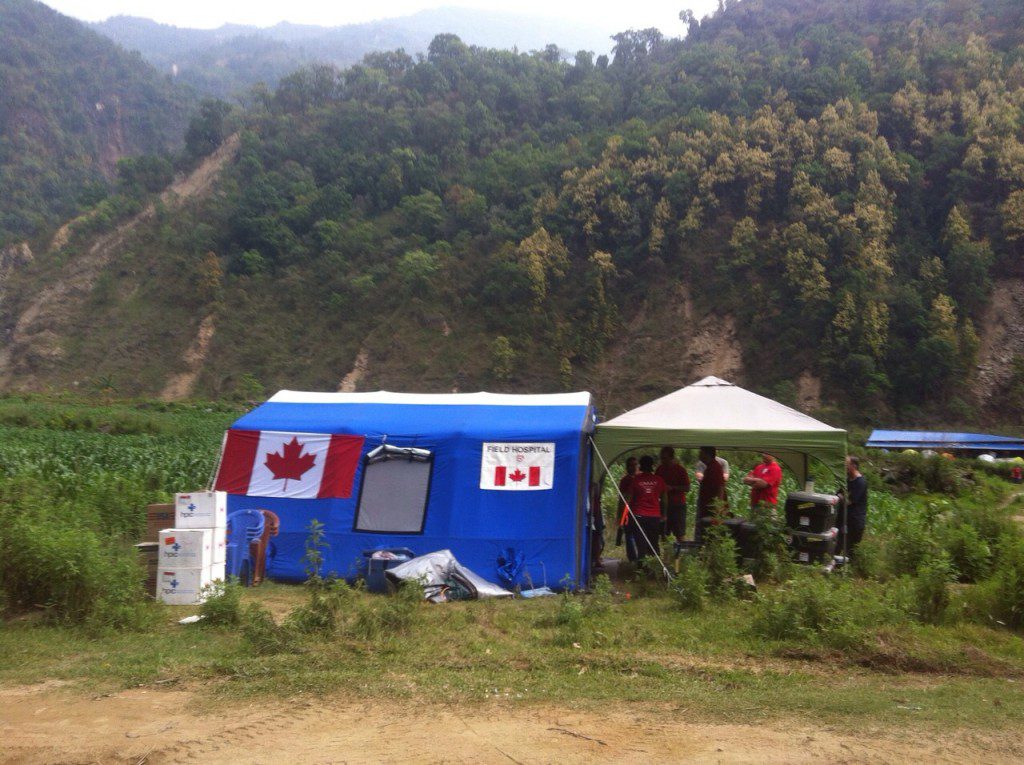
CMAT Field Clinic set up near the town of Balowa in rural Nepal.
The team set up the field clinic on Tuesday and started seeing between 60 and 100 patients per day. In collaboration with the local community elders, a soccer pitch was identified which would serve as a helicopter landing zone in the event of critical emergencies requiring medi-evac. A critical patient arrived at the clinic after dark – an elderly lady with a probable hip fracture. Unfortunately, she was unable to be sent by helicopter due to the time of day, and steepness of the terrain, making a helicopter difficult to land.
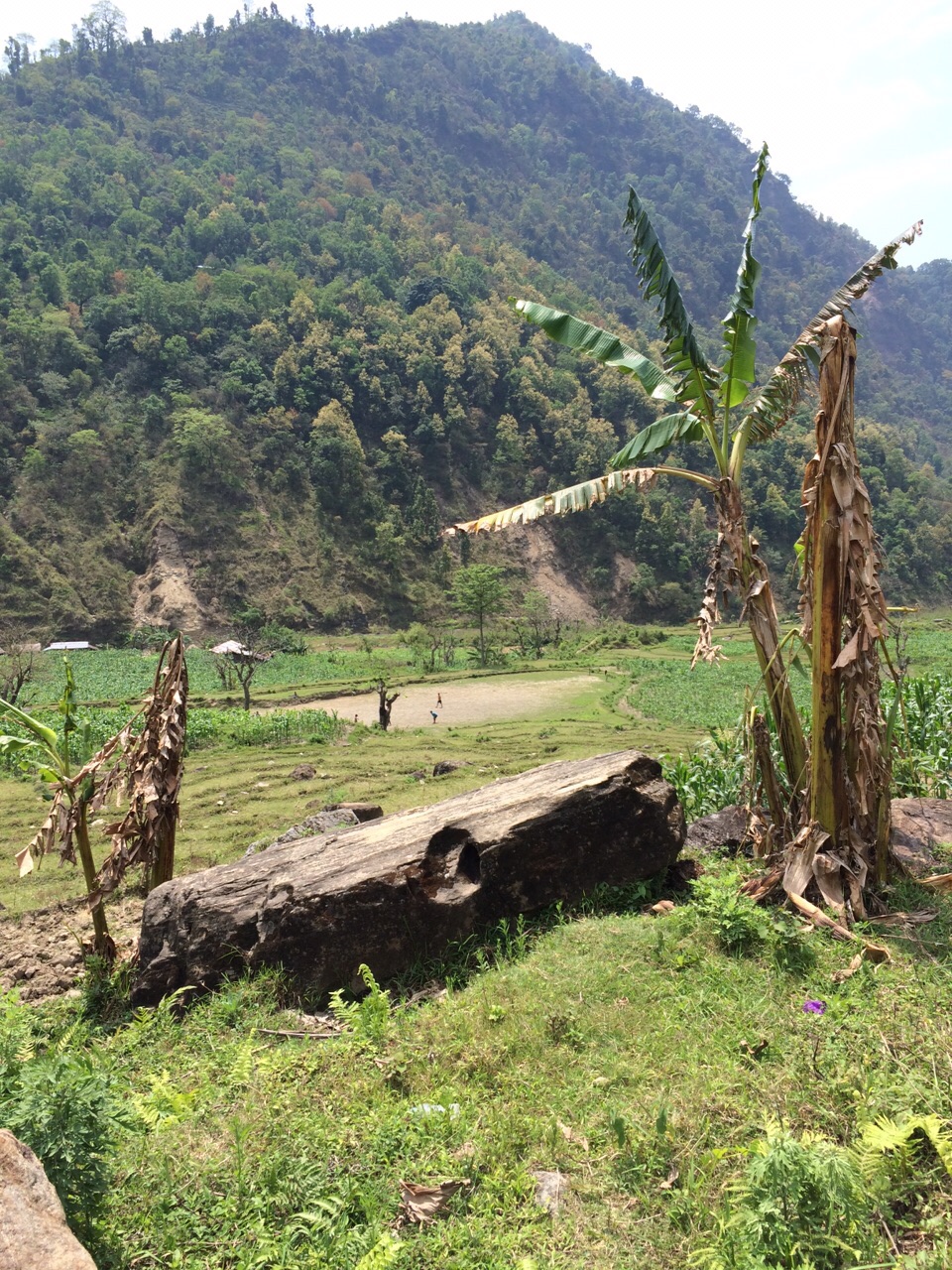
The flat area is a local soccer pitch, which doubles as our Heli Pad Landing zone.
CMAT has secured helicopter air support for critical medi-evacs.
Call for ongoing Medical and Non-Medical Volunteers
Now that CMAT Team 1 has established itself on the ground, this message will detail the info we need to assemble teams for potential subsequent deployments.
Although we are looking at a potential project duration of 60 to 90 days, the situation remains fluid, and needs can change with a moment’s notice.
VERY IMPORTANT:
- Volunteers are responsible for the cost of their return flight to Kathmandu which is being negotiated by CMAT in partnership with several different airlines for the most competative rate. Volunteers are encouraged to set up their own fundraising page by following the instructions found here: Set up your fundraising page on CanadaHelps.org
- Once deployment dates are set, they are firm. Teams must travel in and out of the field location as a group, and there will be no deviation from the set schedule permitted. This is due to the nature of the extensive road travel involved to arrive at the site (8 to 10 hours one way by road).
- THIS IS CONSIDERED AN EXTREME HARDSHIP MISSION. Camp conditions are very basic. This includes using a pit latrine dug by hand, sleeping in tents on the ground on cold evenings, purifying our drinking water, and eating locally prepared cuisine and/or Ration packages. Everyone must pull their weight, especially around camp. While CMAT provides some logistical supports in the field, ultimately YOU are responsible for yourself, espeically in being prepared with your own equipment and supplies.
- Aftershocks are a daily occurrence, and can be very unsettling to both the local community and to ourselves. Evenings and overnights can be very cool in the outlying regions.
- Monsoon season is approaching quickly, and daily downpours are not uncommon. Rainproof gear and groundsheets for your tent are highly recommended.
- Communicable disease is VERY common, in particular gastroenteritis. Japanese Encephalitis is endemic to the region, and while the vaccine is highly recommended, it is not mandatory at this time.
- The local culture is very conservative when it comes to social taboos, especially around attire. Please pack accordingly. (i.e. in public, there are to be no short-shorts, tank tops, etc.) Additionally, there is a no-alcohol consumption policy in effect for this mission.
1. All potential CMAT members must have a complete and up-to-date profile registered on the CMAT website. You can register by clicking here: https://cmat.ca/volunteer/
**Please note: due to recent high traffic volume, our website and registration page has occasionally seen some glitches. Please try again if you encounter an error**
3. Once your expression of interest has been reviewed by our deployment committee and your profile has been shortlisted, we will ask you to send electronic copies of your passport, professional licensure and a passport-style headshot photo. *PLEASE DO NOT SEND THESE UNTIL YOU HAVE BEEN CONTACTED BY THE DEPLOYMENT COMMITTEE AND REQUESTED TO DO SO.*
Alternatively, once your profile is activated, you can upload these documents to our website.
Every dollar counts when we are responding to disaster. We are aiming to raise $100,000, and have nearly reached the $50,000 mark in about two weeks!! You can help by clicking above and donating generously through CanadaHelps.org!!
https://www.canadahelps.org/dn/23550
